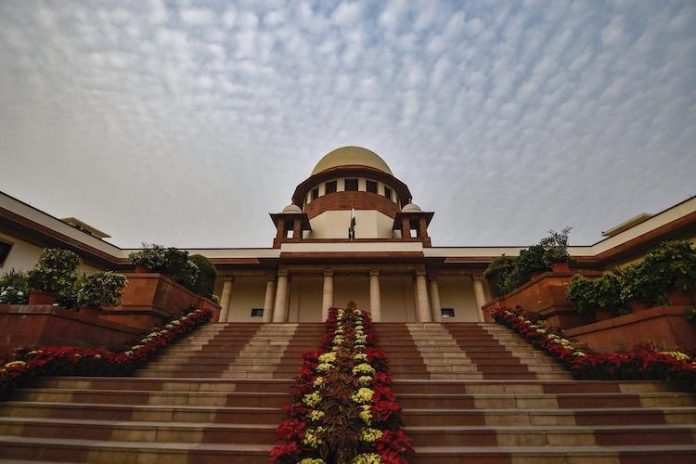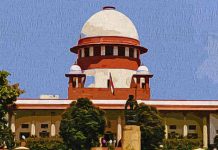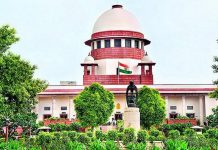The article is written by Naman Sherstra from Department of Law, University of Calcutta. The evolving principles of Social Jurisprudence by the Supreme Court of India has been depicted in the article.
Table of Contents
Introduction
In ancient times the custom was considered as the major source of Law. The source of the personal laws in India has emerged from customs and traditions. Later on, when the Constitution of India was formed in 1950 the inherent rights of the individual were recognised and the state has envisaged the responsibility of social welfare as in the Directive principles of state policy. In recent times the Supreme Court of India has recognised and developed the new principle of jurisprudence called “Social Jurisprudence” where the court has emphasized social rights over political rights.
Since, after the introduction of Public Interest Litigation in 1979, the informal nexus of judges and activists came ahead for the protection of social rights. The Emergency of 1975, played an important role in the uprising of Social rights when the government was curbing the rights of the politician and social activist by illegally detaining them. Post emergency two eminent judges Justice VR Krishna Iyer and Justice P.N Bhagwati felt a need of providing access to justice to those unprivileged sections of the society who were unable to afford justice due to several hurdles. And in this way, the concept of PIL came into existence which triggered Judicial activism. The PIL marked a significant presence in Social change and brought a novice notion of Social Jurisprudence rejecting the laissez-faire notion of traditional jurisprudence.
Despite it, the Apex court has recognised the notion of social Jurisprudence in several other cases discovering the contours of the social Jurisprudence. The decriminalisation of LGBT marriage, and striking down of the National Judicial Appointments Commission are the examples of such cases where the judges have applied the social Jurisprudence recognising social rights. In this article, the author has shown how the Apex court has applied the counters of social Jurisprudence in the judicial system through Judicial activism which has also sometimes proven a threat to “separation of power” between the parliament and the judiciary.
What is Social Jurisprudence?
Social Jurisprudence most commonly known as Sociological Jurisprudence was first propounded by Roscoe Pound during the year 1911 in an article. He was a prolific writer and dean of the Harvard Law School. The American Realist School is the brainchild of the Roscoe Pound. This philosophical approach of this Jurisprudence was to examine the social effect of legal institutions, doctrines, and postulates. The principle examines the social aspect of Law and checks its sociological effect on substantive and procedural law. He stressed the practical aspect of the law and propounded that the function of law is to satisfy the maximum number of people and resolve the conflict of the individuals in society.
This movement of sociological jurisprudence emerged in the era of progressive development where the pound termed it as “a movement for pragmatism as a philosophy of law” where the purpose of which was to provide legal reforms and social change. The formal jurisprudence used the logic of specific assumed principles of precedence, but the social jurisprudence advocated the use of social sciences to develop legal rules and argued for providing the freedom to the Judges to do justice in the specific cases.
The emergence of Social Jurisprudence : United States of America vis-a-vis India
The emergence of social jurisprudence traces back to the United States of America when the US was struggling in the civil war and the rights of the labourers were being infringed by the State. This problem existed till the twentieth century where the law was hostile towards protecting the labours, where the Judges construed it narrowly or held it unconstitutional. The advocates of the Social jurisprudence discarded the judicial response to the social legislations. Pound propounded the theory of social engineering where the judiciary, legislature, and the parliament have to come ahead and make a balance between the public, private, and social interests. In the United States of America the subsistence rights like the right to unpolluted air, right to food, right to minimal economic security come under such kind of right. Neither the Constitution of US nor the Universal Declaration of Human Rights has envisaged such kinds of rights. Such kinds of rights are like freedom which are inherent in the citizens.
In India, the Constitution under Article 51A, in the Directive Principle of State Policy the state has been provided the obligation of providing social, economic, and political justice to its Citizens. The Emergence of Social jurisprudence traces back to the time of emergency when the civil rights of the social activists and the journalists were imprisoned and subjected to police brutality. Post emergency, the judges took a note on the issue and propounded the concept of PIL. The PIL opened a broad path of Judicial activism for the unprivileged class people who can’t afford Justice, using Article 32 of the Constitution of India. Later the Supreme court of India started recognising the broad scope of rights under Part III of the Constitution. Human rights comprise “traditional liberties” and “subsistence rights”. The traditional liberties arise of protests against the suppressive political institutions whereas the subsistence rights arise during protests against the social and economic institutions. The Supreme Court in Minerva Mills vs Union of India recognised the principle of harmony and balance between the fundamental rights and the directive principles of state policy and held it as a basic feature of the Constitution. In case of a political threat to the fundamental rights, the Apex Court has upheld such rights. On the other hand, when the subsistence rights are subject to the threat by the social and economic institutions the Supreme Court has to come ahead for the protection of such kinds of rights. The consciousness of the Judiciary demands higher attention while the subsistence rights are infringed rather than the traditional liberties.
Role of Supreme Court in upholding Social Jurisprudence
The Apex Court has played a very important role in moulding the Social Jurisprudence in the Indian Judicial system through the “Social Change”. However, these social changes were introduced while the Constitution of India was framed and inequality was abolished through inserting Article 15 of the Constitution of India. The Anglo-Saxon Laws were imposed on the Indian legal system by the British where the codified criminal laws and civil laws emerged during the British period. Coming back on the role of the apex court, the Supreme Court has been describing the “unenumerated” rights in the various cases elaborating the scope of fundamental rights from time to time. Earlier it used to protect the subsistence rights when the economic and social institutions used to curb it but later after 1978 after the emergency when the concept of PIL came into existence the Judicial activism triggered up and the traditional liberties were also considered to be important by the court.
Affirmative action under DPSP
The concept of the welfare state as enshrined in the Directive Principles of State Policy and our preamble is also one of the important aspects of social jurisprudence. The state agencies have the responsibility of providing the benefits to their citizens but such tasks are administered by the bureaucracy. Hence, it empowers the executive (bureaucracy) which sometimes becomes a problem to the state itself. Now, in case of improper administration by the government institutions and the departments the subsistence rights of the citizens are infringed. The Judiciary is unable to protect such kinds of rights with the traditional rule of interpretation. Since judges of the constitutional courts are supposed to be the part of the Constitutional set up, they have the responsibility to secure the economic and social rights of the citizens. Here, the judges shift their view from the traditional jurisprudential approach and use their own hands to protect the rights of the deprived class from the tyrannical action of the executive.
The Directive Principle of State policy is a set of social economic and political programs provided under Part III of the Constitution, for the welfare state. However, the DPSP are meant to be dealt in a harmonical way with the fundamental rights provided under Part III of the Constitution of India. The State has been provided with the power under Article 15(4) and Article 16(4) of the Constitution where it can make laws and reservation policies for the upliftment of the socially backward class or the citizens who have not been properly represented in the public services under the state. These Articles were enshrined after the 1st Constitutional amendment to bring a balance in the original provision prohibiting any kind of discrimination on the basis of caste, creed, sex, religion. So, affirmative action has been provided under the constitution, making a balance between the fundamental rights with directive principles where the imagination of the state has been done as a welfare state which can provide social, economic, and political rights to its citizens. The Constitutional courts have always come ahead for the protection of such rights against the infringement by the arbitrary action of the state administration.
PIL and Judicial activism
This is one of the most important aspects that has been exercised by the Supreme Court several times to protect the subsistence rights as well as the traditional liberties. This trend appeared in the decades of 1978 after the introduction of the PIL mechanism when the Supreme court of India started taking responsibility for protecting the rights of citizens in an admirable manner. The newly emerged mechanism forged the traditional approach of interpretation and introduced a new mechanism upholding the rights of the unprivileged class. The credit of introducing the PIL goes to eminent activist Judges like P.N Bhagwati, Krishna Iyer, Chinappa Reddy. SC Justice Dinshah Pirosha Madon on the role of activist judges said, “A Judge who denies to himself Judicial Activism denies to himself the role of Judge”.
In the United Kingdom, Justice Lord Delving had first given the theory of activist judges. The Supreme Court has faced a major hurdle of the welfare state. It has propounded the new concept of “locus standi” and harmoniously interpreted the fundamental rights and the directive principle of state policy. The court has interpreted the socio-economic rights in context with the directive principles and ensuring the citizens towards the path of the welfare state. Article 21 of the Constitution includes the right to livelihood, speedy trial. Similarly, under Article 14 of the Constitution of India, such rights should be ensured in a fair and reasonable manner. The Supreme court of India has been empowered to cross-check the laws of the parliament if it is arbitrary to the “basic structure” of the Constitution. Hence, the Supreme court of India has evolved a new Jurisprudence by protecting the civil liberties and socio-economic rights of the citizens.
Cases where Apex Court has upheld Social Jurisprudence
Striking down of Section 377
In 2018, the apex court partially struck down the provision of Section 377 of the Indian Penal Code. The provision of the Section was gender-biased and it shall now stay inapplicable on the consensual sex between the LGBT communities. Justice R.F Nariman in the Judgement stated that the “Yogyakarta Principle ” animates Article 14 of the Constitution. This principle is a document on human rights in the areas of sexual orientation and gender identity which was the outcome of the international meeting of human rights groups in Indonesia. So, the provision of section 377 is contrary to Article 14 and Article 21 of the Constitution which recognises the right to life with dignity. The Apex court while deciding the constitutionality of Section 377 a colonial-era law applied the sociological approach of jurisprudence instead of the traditional jurisprudential approach.
Abolishing triple talaq and protecting the rights of women
The Supreme court of India struck down the Muslim practise of Triple Talaq having a majority of 3:2. The majority opinion that the court reflected was that the “Triple Talaq” was a sinful practice under the Muslim religion which violated the fundamental rights of the women. However, two judges including the CJI Justice J.S Khehar were of the opinion that although the practice was theologically arbitrary and sinful, it was a part of the “personal law” governed by the Shia sect. The difference in approach of the judges was that in the same judgment where the majority one applied the social approach upholding the rights of the women, what the modern progressive society seeks “equality” erasing the long-existing “discrimination” in the patriarchal society. On the other hand, the minor ones applied the traditional approach of interpreting it to be untouched as it comes under the personal laws which do not govern under the ambit of Article 13. So, the Social jurisprudential approach of the Apex court upheld the fundamental right of the women striking down the arbitrary practice of triple talaq under the Muslim personal law.
Migrant Crisis in the Covid-19 pandemic
The COVID-19 pandemic revealed the failure of the government towards protecting the subsistence rights of the migrants’ labourers going back to their homeplace. The news media, print media were flooded with the images of the labourers travelling back to their homeplaces on foot, and even some of them were trashed by the train. When the PIL was filed against the failure of the government towards making arrangements for the labourers, the apex court at first instance denied interfering in the work of the government. Similarly, at the same time, the Madras High Court and Andhra Pradesh High Court took cognizance of the similar matter and notified their respective State government as well as the Central Government regarding the arrangements to be made for the labourers sending them back to their respective places in a dignified manner. Later, after criticism by the media and several requests made by the advocates the Supreme court took a note on the issue and notified the government to make proper arrangements.
The judicial activism was propounded under the PIL for protecting the “subsistence rights” of the unprivileged, protecting them against any kind of encroachment by socio-economic institutions. However, in this case, the High court had applied the different approaches to the issue at first instance as compared to the SC which had earlier refused to take a note on the issue as excluding itself to intervene in the executive action. The Sociological approach of the courts made the government bend accessing the subsistence rights of the migrants, which the DPSP recognises the State to be a welfare state and strive for the Socio-economic Justice of the citizens.
Ashok Kr Gupta & others vs State of Uttar Pradesh
In the case of Ashok Kr Gupta & others vs State of Uttar Pradesh, the Apex court upheld the social jurisprudential principle by discarding any kind of interpretation that will hamper or intercept the social integration.
Sarla Mudgal vs Union of India
In Sarla Mudgal vs Union of India the Apex court while deciding on the “marriage” stated that such subjects are governed under the personal laws and one’s personal law can’t be overridden by another’s personal laws. The Court applied the social jurisprudential approach in this case in a similar manner as Pound has interpreted that while having conflicts among interests, the interest on a similar plane shall be weighed together.
Bandhua Mukti Morcha vs Union Of India
In the case of Bandhua Mukti Morcha vs Union of India the Apex court observed that the judges while deciding the violation of fundamental rights in a case, should skip from applying the Laissez-Faire approach and adhere to the new techniques freely and act like “activist judges” to protect the fundamental rights of the Citizens.
State of Madras vs Champakam Dorairajan
In the State of Madras vs Champakam Dorairajan, the Apex Court held that the Directive Principle and Fundamental rights should be in harmony and balance as it is recognised as the basic structure of the Constitution. The Court further stated that Article 46 is the Directive Principle and it can’t override the fundamental rights.
Positivist Jurisprudence: critics to the courts for exercising excessive Social Jurisprudence
The Principle of “Separation of Power” provides the boundary of work for every domain of the State, executive, legislature and, the judiciary. The over interference in the work of each one’s domain can create a situation of tension within the state. Sometimes, the Judges while exercising their “Judicial activism” cross the lines supersede the boundary of the legislature by exercising the delegated power of legislation and start making laws. To avoid such an embarrassing situation, the jurists have propounded the theory of “positivist jurisprudence”.
This Concept of positivist jurisprudence was coined by Jurists like Jeremy Bentham and John Austin in the 18th and 19th centuries and was continued by H.L.A Hart during the 20th century. The concept states that the law-making power is vested in the legislature and the judiciary should avoid interference by crossing the separation of power. However, the concept is little different from the nuance of the social jurisprudence but it emphasizes on the literal rule of construction which would provide free hands to the Judges to decide cases with their notions. So, the Judges need to put a balance while exercising such an approach and adhere to the “judicial restraint” as well about the situation of the cases and escape from excessive interference in the domain of the legislature by exercising “social jurisprudence”.
The balance between political rights and social rights: need of the hour
The evolving principle of Social Jurisprudence is one of the important, the Apex Court has adopted in the contemporary era. However, there is a common trend that the court has always preferred social rights over political rights. The silent observation of the court towards the arbitrary internet suspension action in Kashmir shows how courts have restrained itself from interfering in executive action towards the protection of political rights. However, Judges like D.Y Chandrachud have applied a different approach in Bhima-Koregaon case where the Maharashtra government had arrested the political activists having alleged engagement in the violence. Justice D.Y Chandrachud upheld the right to dissent in the case hence protecting the political rights of the Citizens. In Maharashtra government formation case, where the issue of the defection of legislative assembly members the apex court ordered the Governor to conduct the food test. These contemporary issues show that there is a need for balance in the political rights and the social rights of the citizens in the era of evolving social jurisprudence.
Conclusion
The evolving principle of social jurisprudence has served an important role in protecting the human rights of the Citizens. This onus of upholding the fundamental rights of the citizens lies totally upon the Judges of the Constitutional Courts against the arbitrary action of the State. However, many jurists disagree with the nuances of the Social Jurisprudence stating the reason that legislature and the judiciary have their definite domains. The interference of the Judiciary in the domain of legislature by excessive application of “Judicial activism” while protecting the fundamental rights of the citizens may hamper the “separation of power” principle henceforth making a bitter relation between the government and the judiciary. So, at times the Judiciary should adhere to “Judicial restraint” depending on the situation. This will totally depend on the prudence of the judges. The protection of subsistence rights and the traditional liberties of the unprivileged class in a balanced manner shall mould the traditional approach of the Jurisprudence used by the Judges.
References
https://www.thehindu.com/opinion/op-ed/the-need-for-judicial-restraint/article27141605.ece
http://www.supremecourtcases.com/index2.php?option=com_content&itemid=5&do_pdf=1&id=20264
LawSikho has created a telegram group for exchanging legal knowledge, referrals and various opportunities. You can click on this link and join:
 Serato DJ Crack 2025Serato DJ PRO Crack
Serato DJ Crack 2025Serato DJ PRO Crack











 Allow notifications
Allow notifications


